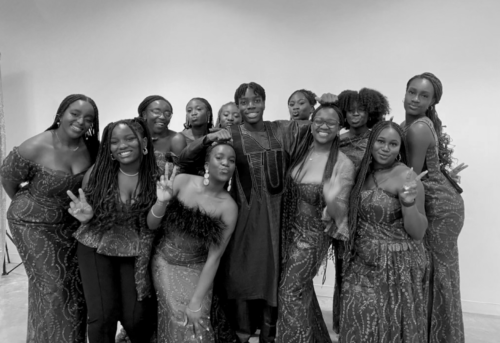September 26th, 1960: Princess Alexandra of Kent, representing Queen Elizabeth II of the United Kingdom, arrived in Lagos, Nigeria smiling from her car as she was greeted by the cheering of schoolchildren. A few days later: on October 1st, the princess would preside over the official freedom charter where Nigeria was declared a sovereign state. Finally, after years of peaceful protests and strikes, Nigerians had won the right to govern themselves.
63 years later, Nigerians and members of the Nigerian diaspora gathered on Harvard’s campus to celebrate Nigerian Independence Day. The Nigerian Students Association (NSA) Independence Day Gala is a yearly event that calls on members of Harvard and neighboring communities to take pride in Nigerian culture and identity. Students from other colleges and students of all ethnic and national descent were also welcome to join the fun.
Answering the question of what it means to have pride in and celebrate being Nigerian, especially for those born or raised outside of the country, can be difficult to fully articulate. The Independent spoke to different Nigerian students on campus to better understand how the NSA Gala has enabled students to embrace their cultural identity during their college years.
NSA Vice President Bolu Ilelaboye ’25, states that being Nigerian on campus is like having a family away from home. “[I love] having such a strong community to fall back on. Since there’s so many of us, we have such a huge support system and we can come together during events like Naija Chatta (a meeting series where NSA members discuss topics related to their lives as young Nigerians) to discuss issues. And because so many of us are Nigerian-American—first-generation Nigerians in America, we have so many shared experiences that are unique to our identity.”
Adaolisa Mba ’27, an auxiliary board member of NSA, reflected on how her cultural upbringing influences her behavior in college. “The part of Nigerian culture that resonates most with me is my role as a first daughter. I think I have a strong sense of responsibility and conscientiousness because of how much responsibility I was given at home. After years of being a second mom, it’s become a habit to be on top of my responsibilities.”
NSA’s Development Chair, Dunmi Ojumu ’25, has been an active member of the organization since her first year at Harvard. As a first-year, she worked to create a Gala that followed COVID-19 protocols. Now as a junior, she expressed her appreciation to be able to help welcome students from Harvard and different colleges to celebrate Nigeria’s independence. “[For the American diaspora], Nigerian independence really means reflecting on what it means to be a Nigerian living in the United States. I think a lot about ‘What does it mean for me to connect with my culture, connect with my roots, and be committed to being Nigerian and actually building up the country and investing in [Nigerian] culture?’ I also think about the Nigerian government and the ways in which it [has] failed the country. Even though we are independent, what are the things that we’ve lost? What are the lessons we’ve learned from colonialism? And what are the ways it’s impacted [us]?”
The many months of hard work spent planning NSA Gala are inspired by a want to “bring together Nigerians, Africans, Black individuals, and so many people who are interested in Nigerian culture,” explained Ilelaboye. In the days leading up to the Gala, NSA held several events, including a speaker series that featured prominent individuals such as Nigerian journalist and activist Betty Abah and a pre-gala mixer with students from Yale, Brown, and Boston University. This year, Harvard NSA’s 14th Annual Independence Day Gala attracted over 400 students from across the Ivy League and New England area.
The gala’s theme, Echos of the Past, Voice of the Future, “[Aimed to incorporate] afro-futuristic themes by highlighting our rich past and cultural traditions in order to help shape the future,” said Ilelaboye.
The Gala highlighted phenomenal student artists through an exhibition. Each of the pieces submitted tied to the theme of afro-futurism, a term used to describe the revision and projection of Black futures and celebration of Black culture, and the Gala’s artwork emphasized the cohesion and intentionality of the event.
The Gala featured an abundance of Nigerian food such as jollof rice and meat pie, students dressed from head to toe in traditional Nigerian attire, and Afrobeat songs blasting through the speakers.
High-profile keynote speakers and award winners were present such as Laolu Senbanjo, a Nigerian performance and visual artist who has previously worked with Beyoncé. Student performances ranged from a spoken word piece by Mike Torto ’25 to a traditional Nigerian dance with a modern twist from Omo Naija x Wahala Boys, Harvard’s premier African dance troupe. A portion of the proceeds from ticket sales will be donated to the Yinka Shonibare Foundation, which aims to help children and underserved communities in Nigeria.
Folukemi Olufidipe ’25, the president of the NSA, was inspired to join the organization as a freshman to have a community that she lacked growing up. “[NSA has] given me so much…Being from Miami, I really had no Nigerians near me except my parents and my immediate family. And honestly, [NSA] really [gives] me a home away from home I want to be able to give back to a community that’s given me so much and kind of want to be the driving force that will keep it going for the soul.”
Olufidipe predicts that future Galas will be characterized by “happiness and riches…[It is not just] about giving a space to the Nigerian community, but [a space for] teaching non-Nigerians about who we are, what Nigeria is, and what [it] stands for. I hope for more involvement, more cross cultural events, and just continuing to share the love.”
Adedoyin Adebayo ’26 (aadebayo@college.harvard.edu) is already brainstorming what to wear at next year’s Gala. Chidimma Adinna ’25 (cadinna@college.harvard.edu) has been listening to Afrobeats non-stop since NSA Gala!

